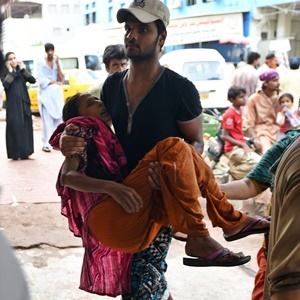
The worst heat wave to hit Pakistan's southern city of Karachi for nearly 35 years has killed more than 1 000 people, a charity said on Thursday, as morgues ran out of space and residents rushed to supply over-stretched public hospitals.
Tents offering iced water and rehydration salts have mushroomed on street corners, run by rival political parties and the military. Residents in one neighbourhood hacked into a main water pipe and then danced delightedly in the spray.
Read: How is dehydration treated?
The heat wave in the city of 20 million people coincided with severe electricity cuts, leaving many without fans, water or light, and the beginning of the holy month of Ramadan, when many Muslims do not eat or drink during daylight hours.
Temperatures shot up to 44 degrees Celsius (111 Fahrenheit) at the weekend, the hottest since 1981, although they dipped to 38C (100F) on Thursday. Forecasters have been predicting rain for days, but there has been no significant fall.
Read: Don't overheat in high temperatures
An influx of dead means body bags have stacked up on the floor of the morgues, said Anwar Kazmi, a senior official of the charitable organisation the Edhi Foundation.
"The refrigeration unit was not working properly because there were too many bodies," he said.
Kazmi said more than 1 000 people had died of heat-related causes so far. The provincial government had done little except try to blame others, he said.
"We pay tributes to the doctors and staff of the government hospitals who are working tirelessly treating an endless number of patients," he said.
Hospitals called in student doctors to work extra shifts and appealed for basic items like sheets and stretchers. Decades of chronic neglect by successive civilian governments or military regimes have gutted social services like health and education.
Many public hospitals said citizens dropped off carloads of iced water and other supplies. The number of patients was slowly declining as the temperature goes down, doctors said.
Jinnah hospital had an overwhelming response to its appeal for cold water and stretchers, said Dr Tasneem Butt, and a charity had arranged for rented air conditioners. As she spoke, her phone rang with a call from another donor.
Behind her a motorised rickshaw pulled up, a young woman inside shouting for help as her father slumped out into the arms of volunteers.
Read more:
Outdoor heat increases hospitalisation in elderly
Too much heat and sunshine could be dangerous




 Publications
Publications
 Partners
Partners










